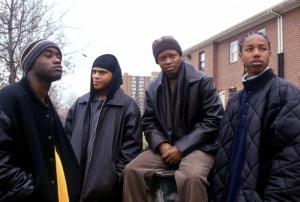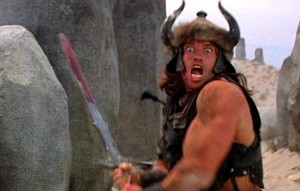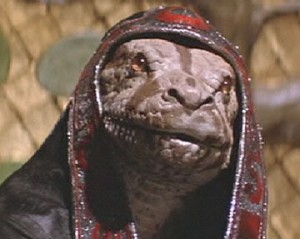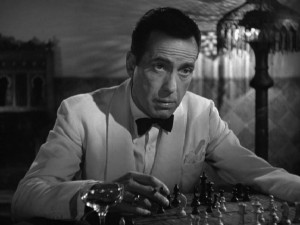 Belinkie: Apparently Obama gave an interview this week, during which he talked about how awesome Omar is. Isn’t The Wire basically a show about gridlock and red tape and the impotency of large institutions? I’ve never seen it, as you all know, but it strikes me as very different then, say, The West Wing. There’s no idealism.
Belinkie: Apparently Obama gave an interview this week, during which he talked about how awesome Omar is. Isn’t The Wire basically a show about gridlock and red tape and the impotency of large institutions? I’ve never seen it, as you all know, but it strikes me as very different then, say, The West Wing. There’s no idealism.
Perich: Given Barack Obama’s explicit, continued support for the War on Drugs, that’s … “ironic” is the nicest word for it.
Sheely: I think that Obama’s love of The Wire can be explained mostly by Orrin Hatch’s observation that Obama is a latte-sipping fedora-wearing hipster.
Stokes: What’s weirder: liking The Wire and backing the war on drugs? Or being a high-ranking official in a governmental agency and liking The Wire?
It’s not that The Wire says that high ranking officials are necessarily wicked or incompetent – it’s that it says they are powerless in the face of institutional pressures to do anything other than feather their own nests. Seems like a weird message for any politician to respond to – an honest one would find it overly cynical, a corrupt one would think it hit too close to home.
For fun now, let’s all imagine the most politically damaging character he could have chosen as his favorite. Is it:
1) Marlo
2) Carcetti
3) Ziggy
Perich: 4) Brother Mouzone.
Fenzel: Well, a politician who feels trapped by institutions would most likely regard The Wire as honest and realistic, and would not feel threatened by it because they see themselves as the protagonist and the other politicians as the real problems.
After all, it is about the heroic struggle of Tommy Carcetti to follow his dreams in a world gone mad, right?
 Belinkie: Of course, Obama is also a big fan of Conan the Barbarian. Conan is also a political figure (a self-made man who becomes king of Aquilonia), but the worldview is pretty much the exact opposite of The Wire. In The Wire, individuals are powerless in the face of the system. In Conan, one man can and does win battles, topples kingdom, defeats ancient evil, etc. It’s the Great Man theory of history, with giant serpents.
Belinkie: Of course, Obama is also a big fan of Conan the Barbarian. Conan is also a political figure (a self-made man who becomes king of Aquilonia), but the worldview is pretty much the exact opposite of The Wire. In The Wire, individuals are powerless in the face of the system. In Conan, one man can and does win battles, topples kingdom, defeats ancient evil, etc. It’s the Great Man theory of history, with giant serpents.
Stokes: See, Conan’s policy decisions as emperor of Aquilonia can only be understood as the product of a Cimmerian anti-colonialist political philosophy.
Fenzel: The thing is, the world in the two stories is pretty similar. Political institutions are corrupt, and the people who run them are malicious, insane, or cowed into submission. The protagonist looks around him or herself and sees no obvious place to turn or way to make things better. The world is a bit too rough for the kind of love we’d all like to surround ourselves with to really survive.
The difference is in the relative success of the heroes to cut the Gordian Knot. I’m not certain one story of exceptional success against many of profound failure necessarily teach mutually exclusive lessons.
We also don’t see when one harvest goes sort of bad and the people riot, begging Conan to reinstate the snake god, which he ends up having no choice in doing, with the rationalization that it is a young, small snake god and he can slay it later when things improve.
Stokes: The fundamental difference between the Conan-verse and, uh, Baltimore, is that he *would* slay it, although not before it had gotten totally out of hand.
Also, we just described the back half of the Zemeckis Beowulf adaptation.
 Lee: I think we should extend the use of the snake god as a metaphor for as many policy conundrums as possible. Example:
Lee: I think we should extend the use of the snake god as a metaphor for as many policy conundrums as possible. Example:
Financial sector deregulation – The Snake God wreaked havoc generations ago, but we let the Snake God come back, thinking the Snake God would regulate itself while making us fabulously wealthy.
Perich: Health Insurance: the temples of the Snake God minister to the sick and wounded, but they also extort dire levies from the provincial governors. Everyone agrees that huge lines of plague victims circling the temple, waiting to be treated, are an inefficient means of addressing the problem. But nobody has an adequate solution.
In the meantime, the governors tack new decrees onto the existing solution, creating a complex bureaucracy that just barely functions. The latest law is that, instead of tithing to the Snake God, citizens will tithe to the governor’s office and receive a special sash that entitles them to healing balms. This has led to shorter lines at the temple but increased confusion.
Fenzel: In one view, the snake god is a good example of the difference between allegory and symbol. The snake god doesn’t really claim to reference a specific idea, trend, institution or thing. It comes to symbolize a variety of things depending on how it appears in a given story. In the scene about the Riddle of Steel where James Earl Jones makes the young girl jump to her death, the snake god represents rapacious male sexual hunger — but Conan, in opposing the snake god, doesn’t really oppose that directly. In the scenes where Conan actually confronts and sets himself against the snake god, it tends to represent other things.
Another way of looking at it is that the tension between wanting a snake god and wanting to kill the snake god is irresolveable – and it’s not really a quality of institutions or religious entites, but of the human psyche – more specifically the human psyche viewed through the lens of language, rather than through, say, cognitive experiments on people’s general feelings about snakes. The snake god is the unachievable major object of desire, and the only way to actually satisfy your desire for it is to kill it – which means not necessarily that people must wreck things they like, or just that desire is dangerous, but that major desires can only exist as major to us if we consider them from a certain distance. Because of the way our consciousnesses and relation to other things are brought into being, there’s a way by which the major object of desire ceases – either we kill it, it kills us, it becomes so sinister as to no longer be desired – our semiotic and psychological relationship with the Big Things we want is necessarily unstable.
One could say the same of the Presidency. It is the thing you really really want until it becomes close enough to you that by one mechanism or another it has to cease being the thing that it was.
One could say the same of Hampsterdam.
Belinkie: Let’s kick it up a notch. According to Barack Obama’s Facebook page, his favorite movies are:
Casablanca, Godfather I & II, Lawrence of Arabia, and One Flew Over the Cuckoo’s Nest
I think those are VERY interesting. The Godfather movies, Lawrence of Arabia, and One Flew Over the Cuckoo’s Nest are all about men growing into leaders. They start the movies actively ducking responsibility, step up to the plate, earn the trust of their subordinates, and rise to greater heights than anyone thought possible. But effective leadership comes at horrible personal cost. Michael Corleone alienates his wife and kills his own family members, Lawrence leads his men in a horrible massacre, and Jack Nicholson gets pillowed to death. These leaders are miserable and lonely men.
As for Casablanca, I’m guessing he’s just a big old softie at heart.
Mlawski: Jeez, what does it say about me that my very first thought was, “Do any of those pass the Bechdel test?”
 Lee: Casablanca is thematically different from those, but the Obama appeal is pretty clear. Rick gives up the thing that would make him personally happy (staying with Ilsa) because he knows it’s for the Greater Good (helping Victor Lazlo fight Nazis). In Obama’s case, he gives up the thing that would make him personally happy (teaching law, shooting hoops, writing books, not being constantly accused of being a crypto-fascist Muslim socialist from Kenya) because he knows it’s for the Greater Good (being President of the United States, mandating coverage of birth control in health care plans).
Lee: Casablanca is thematically different from those, but the Obama appeal is pretty clear. Rick gives up the thing that would make him personally happy (staying with Ilsa) because he knows it’s for the Greater Good (helping Victor Lazlo fight Nazis). In Obama’s case, he gives up the thing that would make him personally happy (teaching law, shooting hoops, writing books, not being constantly accused of being a crypto-fascist Muslim socialist from Kenya) because he knows it’s for the Greater Good (being President of the United States, mandating coverage of birth control in health care plans).
Perich: Casablanca also has some interesting things to say about the utility of law-enforcement institutions in achieving real justice, if you consider Captain Renault’s face turn at the airfield.
Fenzel: This sort of raises the point of what “Barack Obama” is. Are these the actual favorite movies of an actual person, or attributes of a construction put together as part of a discourse of power? Is there a difference, discursively? Is there any way to tell?
And that’s where we left it, Overthinkers! But what do you think? Do Barack Obama’s stated pop culture favorites represent the genuine fandom of a constitutional scholar? Or are they calculated ploys to appeal to voters? Or does the one naturally lead to the other and back again? And how would King Conan of Aquilonia handle the entitlement burden of the Boomer generation? Sound off in the comments!
![[Think Tank] Obama, The Wire and Conan the Barbarian](https://www.overthinkingit.com/wp-content/uploads/2012/03/obama-the-wire-conan.jpg)
He’s a politician, so it’s probably a mix of movies he actually likes and classics he finds relatively safe to mention. You can’t list a bunch of idiosyncratic choices or it sounds weird. You can’t list the beginning of the AFI 100 or it sounds fake. So it’s a bit of both.
Is liking the Wire and supporting the War on Drugs really that dissonant? Maybe for you or me, but Bunny Colvin makes a pretty solid case that anyone with any ambition in the government sector has no real choice in the matter.
This is a valid insight, but, as the man who appoints the Attorney General and the director of the DEA, Obama could make the War on Drugs less of a priority if he wanted. He could, for instance, order the DEA to stop raiding perfectly legal medical marijuana dispensaries, just for a start.
As much as I’d like to think it was as easy as appointing a new department head, it’s not. There’s an entire prison industrial complex backing the “war on drugs,” and any department head nominations must make it through Congress. With the way law enforcement post-9/11 has been, I’d also include there the head of Homeland Security; but since it’s such a complex issue, I imagine the Secretary of Housing and Urban Development would probably need to be involved, too, and maybe even Education and Health and Human Services. I can see maybe one or two department heads against the war on drugs getting through, but not enough, unless it was the secret criteria a president set for them and then, SURPRISE! a few days into their tenure.
And then there’s the bureaucracy to contend with. Bureacracy is notorious for being set in its ways and only changing when expanding more whenever possible- retrenchment is always resisted adamantly, and the “conservers,” as they’re called, would do any and everything they could to sabotage implementation of new policies or termination of old ones.
And some judges would prolly have to be swapped, law enforcement strategies altered…
It’s all a clusterf***, and even if a new DEA set new policies, that does nothing to guarantee the “war on drugs” would end any time soon. Making sure subordinate offices and such are compliant would take far too much oversight for the D.C. muckymucks- monitoring is costly, and they don’t have the person-power to do that sort of thing.
My disclaimer: Does this mean I think the status quo is good? ‘Course not. It could start with an appointment that would push policies to make the “war on drugs” less of a priority, but it would take multiple presidencies for that to finally hit the ground where it counts, i.e. the neighborhoods where kids are getting arrested for standing next to someone lighting a doobie or those perfectly legal medical marijuana dispensaries.
In my perfect world, at least marijuana would be regulated and taxed just like liquor and cigarettes. But that’s totally not happening any time soon. And this has nothing to do with whether I’d light up or not, and it’s not even about a person’s right to smoke. The government could make a lot of money off a luxury tax hiking up the price of pot, and if it sold it itself? Holy crap.
What about the implications of Omar specifically? Does Obama see himself as a man above but dependent on a system? Does he see himself as a vigilante, or wish that he could be one? Or does he like Omar because Omar is the most likable? Is there a sort of phallic envy of the power Omar can exert over his environment, smoking Newports over Obama’s Marlboros? Is it possible to find Obama’s favorite cereal online?
I guess the question really boils down to “Does Obama like Omar because he sees himself as similar to him or separate from him?”
Liking Omar as a character is good, but it doesn’t jibe with his governing style very well. Omar is outside of the system; he stands apart from it with his own code and ideas of right and wrong. He is independent and gives not a crap what other thinks. You know what this means:
Omar is Ron Paul.
No, Obama’s governing style, for good or ill or something inbetween, is to rework the system from within. That doesn’t really make him anyone on the show. Maybe Carver, since he’s a less-revolutionary Bunny Colvin?
To be fair, Obama has talked about Omar being his favorite character a couple times, and he’s never gone into depth. All he says is basically, “He’s the most interesting character, even if I don’t approve of the things he does.” So, in the end, he probably just thinks Omar is really engaging as a character. That, or they both share a love of Honey Nut Cheerios.
*Thumb up* really good observation in my book
Barrack Obama: Want to be Conan the barbarian, but probably feel like he’s in the wire
That list of movies is pretty suspicious. At the very least it has been sanitized by PR managers.
I think this discussion focuses too much on the plot of The Wire. Perhaps Obama is more interested in the function of The Wire, rather than its form. There’s a lot of strategic value in aligning oneself with a critically acclaimed show that is considered both a cinematic and intellectual achievement, known for its creative way of looking at problems and its fierce integrity. The Wire is basically the opposite of 2.5Men – and this differentiation is highly politically charged.
Or maybe Obama is simply powerless to resist the greatest television show of all time.
Waiting for Mitt Romney to announce that the Snake God will be his running mate. Once he, you know, locks down the nomination.
ROMNEY / SET: A Return to Traditional Values
How does Obama stack up against Conan’s “Crush your enemies, see them driven before you, and hear the lamentation of the women”?
Crush your enemies – His 2008 victory was fairly commanding, but since then, he at first tried to work with his Republican enemies before getting crushed by them in 2010 and in subsequent legislative battles.
See them driven before you – Republican contenders for the nomination aren’t quit driven before him (odd turn of phrase, when you think about it), but they are fighting with each other more than they’re fighting him.
Hear the lamentations of the women – why yes, he did exactly that when he spoke to Sarah Fluke on the phone. Though that’s probably not what Conan was talking about.
More literally: “Crush your enemies, see them driven before you, and hear the lamentation of the women” as long as the video and audio pickups on the drones are fully functional.
+1
“We also don’t see when one harvest goes sort of bad and the people riot, begging Conan to reinstate the snake god, which he ends up having no choice in doing, with the rationalization that it is a young, small snake god and he can slay it later when things improve.”
Funnily enough, one of the biggest themes of “The Phoenix on the Sword,” the very first Conan story, was Conan coming to grips with a fickle populace who was all too ready to hail him as The Liberator back before he was king, only to turn his back on him after he gained the crown, viewing him as a red-handed plunderer who stole the throne. Even though he wins a battle (a conspiracy of high-ranking nobles attempt to kill him while he sleeps) the deeper problems of ruling a kingdom are unresolved by the story’s end, and it’s something Conan would have to wrestle with later stories set during his reign.
I’m sure one could draw any number of political parallels there.
I’ll admit, if Obama concluded his DNC address with, “Rush in and die – I was a man before I was a king!”, I’d cheer.
But also, y’know, fascism.
There’s a proverb from prehistoric Hawaii that says something like “If the old chief wasn’t publicly murdered, you can assume he was privately poisoned by the new chief.” I’m guessing most successions didn’t go very smoothly for them.
None of the movies listed on Obama’s Facebook pass the Bechdel test. There are almost no women at all in Lawrence.
There are no women with speaking roles in Lawrence, so it passes the anti-Bechdel.
It’s the usual difference, isn’t it? For the most part, the people in The Wire aren’t prepared to utterly destroy the system – not purely of government, but of society as a whole – to achieve what they want, while Conan is. In fact, Conan doesn’t really care about having any system at all – he’s more or less willing to knock down even the system he set up himself, if he finds it’s necessary at the time.